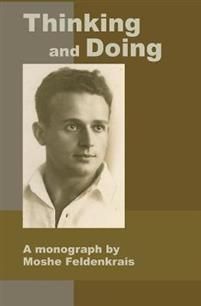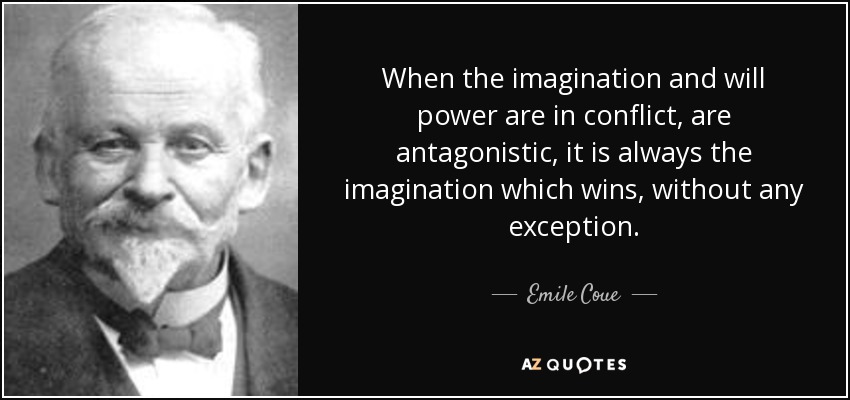Èmile Coué
Varje dag och på alla sätt blir jag bättre och bättre
Det är inte viljan som styr utan föreställningen
Thinking and doing inspirerad av Èmile Coué
Moshe Feldenkrais kom i kontakt med Èmile Coués' bok Autosuggestion under ungdomsåren i Tel Aviv och i samband med sin svåra knäskada. Han blev så begeistrad av vad han kom i kontakt med att han översatte boken till hebreiska 1929-30 för att ge ut den två gånger, först på förlaget Binah (förstånd), sedan en gång till 1977 på broderns bokförlag Alef. Boken finns att ladda ner i sin helhet Länk[+]
MF kompletterade boken med två kapitel, "The unconscious as executor" och "Last in deed, first in thought", som ska ses som ett frö till det som senare kom att utvecklas till feldenkraismetoden.
Jag fick en kopia för många år sedan av kollegan Yona Postel i Tel Aviv. Jag fascinerades av vad jag läste och tyckte det var synd att endast den hebreisktalande allmänheten skulle kunna ta del av MF's tidiga funderingar kring autosuggestion. Efter smärre övertalningar åtog sig Reuven Ofir att översätta den till engelska och efter många turer publicerades de kompletterade kapitlen till Autosuggestion 2013 i en monografi under namnet Thinking and doing. Med i monografien är de två förorden;
- ett från april 1930 av religionshistorikern Hugo Bergman och
- ett från februari 1977 då den gavs ut på nytt med psykologi professorerna från Tel Aviv, Hans och Shulamit Kreitler.
Detta är efter San Fransisco utbildningen 1975 och uppenbarligen anser MF att boken fortfarande är högst relevant. Kreitlers grundande institutionen för psykologi på Tel Avivis universitet, samma institution där MF gav en serie föredrag under 60 talet. (ännu ej översatta):
Moti Nativ, som varit behjälplig i att få projektet i hamn, kompletterar med ytterligare en introduktion av M. Feldenkrais' idévärld. Denis Leri bidrar med några ord på försättsbladet som utgör "reklamen" för boken.
IN ENGLISH
Moshe Feldenkrais came into contact with Èmile Coués' book Auto-suggestion during his youth in Tel Aviv and in connection with his severe knee injury.
He was so enthusiastic by what he encountered that he translated the book into Hebrew and supplemented the book with two chapters;
"The unconscious as executor" and "Last in deed, first in thought".
He publish the book twice, first in 1929-30 at the Binah (Wisdom) publishing house. A second time in 1977 in connection with his second training in San Fransisco. This time at his brother's publishing house, Alef.
For many years, Autosuggestion was a reference point for Moshe Feldenkrais as he continued to develop his work. He mentioned Coué in various aspects of his later publications, including Body and Mature Behavior and Improving the Ability. Both of these books are considered milestones in the development of the Feldenkrais Inquiry
In the first publication, a foreword is written in April 1930 by professor Hugo Bergman, Jerusalem. In the second publication, a preface is written in February 1977 by Hans and Shulamit Kreitler, psychology professors from Tel Aviv University.
The Kreitler couple founded the department of psychology at Tel Aviv University, the same department where MF gave a series of lectures during the 60s. (not translated).
The book Autosuggestion is available to download in its entirety Länk[+]
The first edition of the book you are holding saw light in 1929. Coué helped hundreds of thousands help themselves,
His idea is that imagination is more important than willpower. Imagining the good and the successful helps more than any other striving.
The Kreitler professors, pioneers in cognitive research, believe this book is more important these days than in the past.

Every day, in every way, I'm getting better and better
Tous les jours à tous points de vue je vais de mieux en mieux
For many years the two chapters were only available in Hebrew. Most of the pedagogues did not have access to it.
I got a copy sometime after the turn of the century by Yona Postel, Tel Aviv, was fascinated by what I read, and thought it a shame that only the Hebrew-reading public could share these early comments on autosuggestion.
After some persuasion, Robbie Ofir undertook to translate it into English and after many rounds, the completed chapters of Autosuggestion were published in 2013 in a monograph under the name Thinking and doing.
The image precedes the action
References to the two chapters in Autosuggestion
